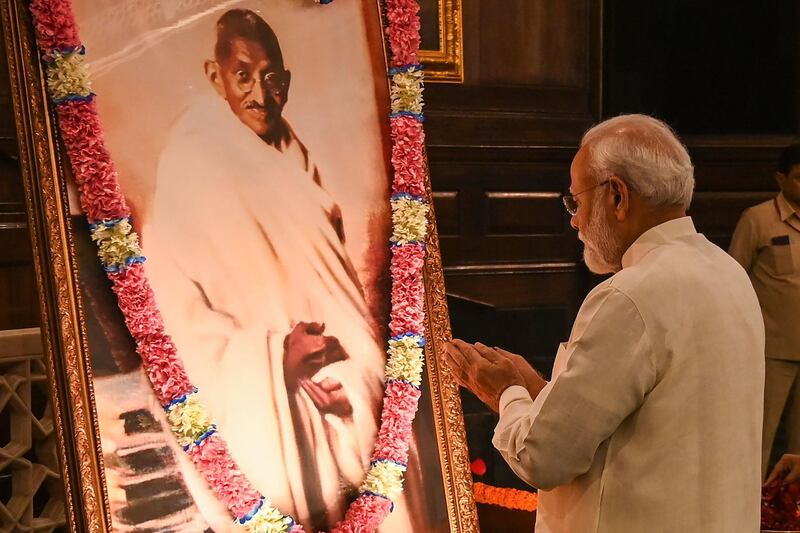Doubts have been raised over Indian Prime Minister Narendra Modi's claim late on Wednesday that all Indians now have access to toilets.
On a day that marked the 150th birth anniversary of India’s freedom fighter Mahatma Gandhi, Mr Modi declared that no rural Indians, almost three quarters of India’s 1.3 billion population, defecated in the open.
"In 60 months, we have provided toilets to over 600 million people by constructing over 110 million toilets," he said. "The world is amazed at our success."
Mr Modi was addressing a function remembering Gandhi in the western Indian city of Ahmedabad in Gujarat state, the audience of which included about 20,000 village heads from various states.
He said the success was due to the work of the Clean India Mission, the federal government’s flagship sanitation programme, which has created about 7.5 million jobs.
Mr Modi said that Indians had shed their hesitation in talking about sanitation and had changed their behaviour to use toilets.
On the same day five years ago, he announced the ambitious Clean India campaign to build 120 million toilets across the country by October 2, 2019.
Its other goals included cleaning up streets, achieving 100 per cent door-to-door waste collection, building solid-waste management plants in each town, decreasing single-use plastics and persuading Indians to adopt better sanitation practices.
"A clean India would be the best tribute India could pay to Mahatma Gandhi on his 150th birth anniversary in 2019," Mr Modi said in 2014.
In the five years between, politicians, sportspeople and Bollywood stars took part in a government-sponsored publicity campaign to promote the Clean India campaign, involving millions of dollars.
Clean India Mission's urban director VK Jindal said earlier on Wednesday that toilets had been built in all urban centres and the target had been 100 per cent achieved.
Doubts remain over the government’s claims. More than 300 million Indians were still defecating in the open in 2017, according to the World Bank.
Experts say while the construction of toilets has increased in the country, lack of water, poor maintenance and slow changes in people’s behaviour have stood in the way of ending the practice.
The Research Institute for Compassionate Economics surveyed 3,235 households in four north Indian states in 2014 and 2018.
Their research, released in January this year, found that open defecation had been reduced by 26 per cent since Clean India was launched, and access to household toilets increased from 37 per cent in 2014 to 71 per cent in 2018.
But the study found that 23 per cent of people who owned a toilet did not use it.
Rejecting the government’s claim, Sanjay Nirupam of the opposition Congress party said that people were continuing to go to the toilet in the open, even in cities such as Mumbai.
"This government is working only to create headlines,” Mr Nirupam said. "The government should provide the facility to every household and we support the government in that.
"But to claim that everybody has got a toilet and nobody is going in the open is completely a bogus statement."
Rajeev Sharma, an independent commentator on strategic affairs told The National that in 2015, 524 million Indians had no access to toilets or were not using them.
“If the Narendra Modi government has been able to give 524 million people access to toilets, then it's definitely a superhuman effort," Mr Sharma said.
"But the Indian government's claim has to be verified by independent global agencies."
Last week, the Bill and Melinda Gates Foundation gave Mr Modi the Global Goalkeeper award for the campaign and for publicising the benefits of sanitation and hygiene.
The foundation was widely criticised for its choice of recipient, with one staff member quitting over it.
Just hours after Mr Modi received the award, two Dalit children – Roshni Valmiki, 12, and her nephew, Avinash, 10 – were beaten to death in a village in central India's Madhya Pradesh state for defecating in the open.
Their village was declared free of the practice by the government in April last year.






